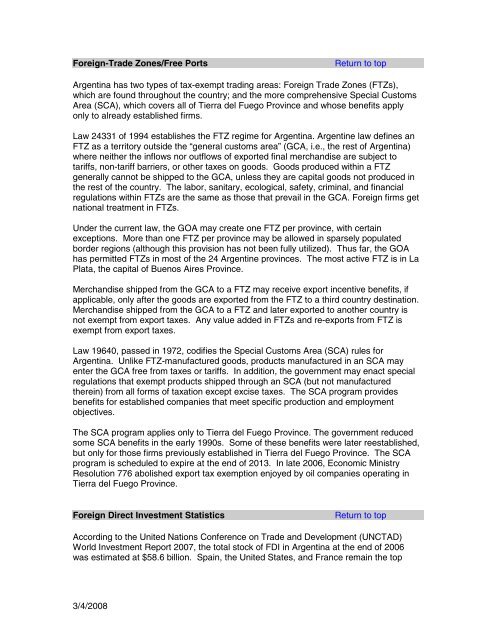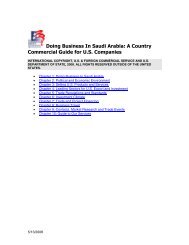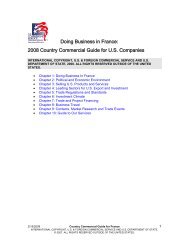Create successful ePaper yourself
Turn your PDF publications into a flip-book with our unique Google optimized e-Paper software.
Foreign-Trade Zones/Free Ports Return to top<br />
<strong>Argentina</strong> has two types of tax-exempt trading areas: Foreign Trade Zones (FTZs),<br />
which are found throughout the country; and the more comprehensive Special Customs<br />
Area (SCA), which covers all of Tierra del Fuego Province and whose benefits apply<br />
only to already established firms.<br />
Law 24331 of 1994 establishes the FTZ regime for <strong>Argentina</strong>. Argentine law defines an<br />
FTZ as a territory outside the “general customs area” (GCA, i.e., the rest of <strong>Argentina</strong>)<br />
where neither the inflows nor outflows of exported final merchandise are subject to<br />
tariffs, non-tariff barriers, or other taxes on goods. Goods produced within a FTZ<br />
generally cannot be shipped to the GCA, unless they are capital goods not produced in<br />
the rest of the country. The labor, sanitary, ecological, safety, criminal, and financial<br />
regulations within FTZs are the same as those that prevail in the GCA. Foreign firms get<br />
national treatment in FTZs.<br />
Under the current law, the GOA may create one FTZ per province, with certain<br />
exceptions. More than one FTZ per province may be allowed in sparsely populated<br />
border regions (although this provision has not been fully utilized). Thus far, the GOA<br />
has permitted FTZs in most of the 24 Argentine provinces. The most active FTZ is in La<br />
Plata, the capital of Buenos Aires Province.<br />
Merchandise shipped from the GCA to a FTZ may receive export incentive benefits, if<br />
applicable, only after the goods are exported from the FTZ to a third country destination.<br />
Merchandise shipped from the GCA to a FTZ and later exported to another country is<br />
not exempt from export taxes. Any value added in FTZs and re-exports from FTZ is<br />
exempt from export taxes.<br />
Law 19640, passed in 1972, codifies the Special Customs Area (SCA) rules for<br />
<strong>Argentina</strong>. Unlike FTZ-manufactured goods, products manufactured in an SCA may<br />
enter the GCA free from taxes or tariffs. <strong>In</strong> addition, the government may enact special<br />
regulations that exempt products shipped through an SCA (but not manufactured<br />
therein) from all forms of taxation except excise taxes. The SCA program provides<br />
benefits for established companies that meet specific production and employment<br />
objectives.<br />
The SCA program applies only to Tierra del Fuego Province. The government reduced<br />
some SCA benefits in the early 1990s. Some of these benefits were later reestablished,<br />
but only for those firms previously established in Tierra del Fuego Province. The SCA<br />
program is scheduled to expire at the end of 2013. <strong>In</strong> late 2006, Economic Ministry<br />
Resolution 776 abolished export tax exemption enjoyed by oil companies operating in<br />
Tierra del Fuego Province.<br />
Foreign Direct <strong>In</strong>vestment Statistics Return to top<br />
According to the United Nations Conference on Trade and Development (UNCTAD)<br />
World <strong>In</strong>vestment Report 2007, the total stock of FDI in <strong>Argentina</strong> at the end of 2006<br />
was estimated at $58.6 billion. Spain, the United States, and France remain the top<br />
3/4/2008












